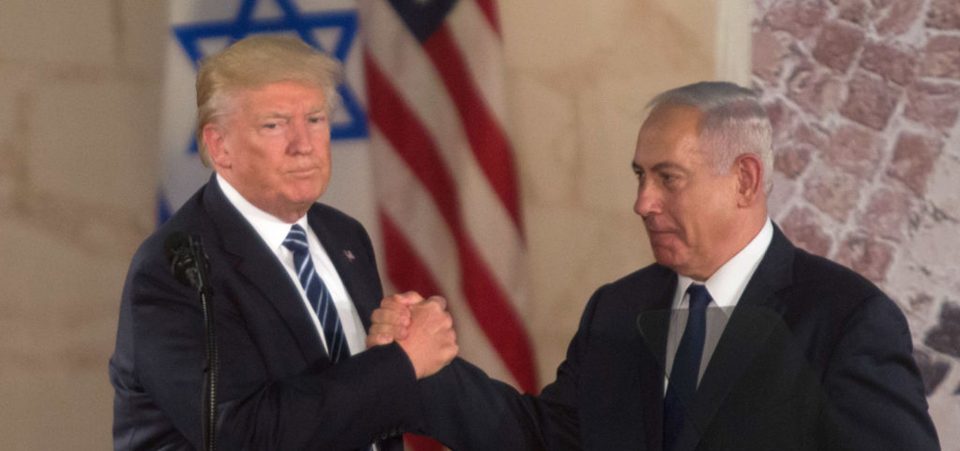Trump to Recognize Jerusalem as Israel’s Capital
President Donald Trump must be deaf. He has ignored warnings about the potential disastrous consequences of moving the U.S. Embassy from Tel Aviv to Jerusalem from everywhere. But Trump thinks he’s Caesar and he’s predestined to cross the Rubicon.
Of course, Israel will be aware of the risks of such a move. While Prime Minister Netanyahu and many in his cabinet welcome Trump’s move, Israeli security forces have already started to take precautions ahead of a certain Palestinian revolt. Palestinians, indeed Muslims, consider Jews visiting the Temple Mount/al-Haram al-Sharif (“The Noble Sanctuary”) in Jerusalem as a provocation.
Some historical context is necessary to understand why Trump’s Jerusalem intentions are reckless. Israel gained independence in 1948 under the auspices of United Nations Resolution 181. Jerusalem was first granted a special international status. The Arab countries challenged this status and launched a war against Israel (the first Arab-Israeli War). Jerusalem was divided in two, whereby the Israelis would control the West and the Jordanians would control the East (where the Temple Mount is located). In 1967, the Israelis entered and claimed East Jerusalem during the Six Day War. The U.N. and most countries have not recognized Jerusalem as the Israeli capital–officially, not even the United States has done so. Trump wants to break with this policy, but the framework in which he intends to do so is so explosive, no wonder Trump’s intentions on Jerusalem have been so quiet.
Could This Cause Another Intifada?
The so-called second “Intifada” (meaning “uprising” in Arabic) began shortly after Israeli opposition leader Ariel Sharon’s Temple Mount promenade on September 28, 2000. To grasp the significance of Sharon’s action and the Palestinian reaction, consider that when the Israeli army captured the Temple Munt/al-Haram al-Sharif on June 7, 1967, then-Minister of Defense Moshe Dayan swiftly demanded the removal of the Israeli flags that troops had placed on the site. Famously, Dayan is believed to have explained this demand saying, “we don’t need a holy war.” (Source: “Status quo on the Temple Mount?,” Foreign Policy, October 17, 2012.)
While not all Israelis agree, Dayan instituted a precedent that effectively bans Jews from entering the area of the Mount. He entrusted control of the holy site to the Islamic Trust (Waqf) that looked after the site for decades. The Jews believe the Temple Mount to be the site of the First and Second Temples, serving as their spiritual center since 0th century B.C., when King David chose the site to build the temple. Meanwhile, since 705 A.D., Muslims have worshipped at the al-Aqsa Mosque, considering it the third-holiest place in Islam.
Palestinians fear that the Israelis want to destroy the mosques and build a new and third temple. American evangelicals, whose votes Trump secured in the 2016 election, have certainly encouraged the erection of the Third Temple. Such is the context in which an American recognition of Jerusalem as capital will be seen. Palestinians and Muslims will see it as a de facto cancellation of any peace process. (Source: “Joshua vs Jesus: Why white evangelicals love Donald Trump,” Baptist News Global, October 3, 2016.)
The result would merely cause the Gaza Strip to explode. Israeli security forces are on the highest alert, expecting a violent Palestinian revolt in Jerusalem itself. In fact, if the Second Intifada serves as an example, there could be a rapid resumption of suicide bombings and other attacks against civilians. But it would be a mistake to think such reactions will be confined to the Palestinian Territories and Israel.
Where Islamic State Has Failed, Trump Could Succeed
What Moshe Dayan feared could happen with the waving of Israeli flags on the Temple Mount in 1967 could happen in 2017: a holy war. The effects would be felt far beyond Ramallah, Hebron, and Jerusalem. There could be a massive backlash throughout the Islamic world, and in the West as well, among immigrant communities. Trump is gambling with global security. The Islamic State and its progenitors ISIS and al-Qaeda tried to instigate a “clash of civilizations” over the past few years. Concerted military and diplomatic action (mainly from Russia) succeeded in defeating such goals. However, Trump seems determined to give it one more good ol’ college try.
Moving the American embassy to Jerusalem is a de facto recognition that Jerusalem is the capital of Israel and the Jewish People. It would effectively cut off Palestinians from the equation. There would be no peace process to speak of, because the status of Jerusalem has been one of the biggest obstacles. Most proposed solutions would maintain a variation of the status quo, leaving the Palestinians control of East Jerusalem and the Israelis control of West Jerusalem. There’s no need to speak of chances of a severe backlash. There is a precedent, which helps to predict what will, rather than could, happen. (Source: “One State/Two States: Rethinking Israel and Palestine,” Dissent, Summer 2010.)
There’s a Canadian Precedent
Trump is not the first Western political leader to have made an election issue out of moving the location of the embassy from Tel Aviv to Jerusalem. In 1979, Canadian Conservative leader Joe Clark promised just that, trying to secure the support of the traditionally Liberal Party-voting Jewish community. Clark set a precedent that would have completely compromised Canada’s traditional stance of neutrality in the matter of Jerusalem. When Clark decided to put his promise into action, the Arab League threatened to wage heavy sanctions against Canada, which could have cut as much as two percent off the GDP. Clarke proved to be a pragmatist; he abandoned the project against heavy pressure from Canadian business. (Source: “Joe Clark’s Diplomatic Crisis,” CBC, last accessed December 5, 2017.)
That was Canada in 1979. It wasn’t exactly a global influence heavyweight, certainly not compared to the United States. We can, therefore, determine that even the Saudis–whom Trump has courted and tried to please, even at the expense of actual American interests–would turn their back on him. They could apply significant economic pressure–and no, it doesn’t even have to be oil. The Saudis and the other allied Gulf Arabs, from the Emirates to Qatar, could merely cancel the $300-$400.0 billion in military hardware, oil contracts, and airliners they have ordered, infuriating the various U.S. oil, aerospace, and military equipment companies and their investors. If Canadian money talks, the American kind screams. Trump would also have to confront a “Muslim spring” on U.S. soil. This would not necessarily be violent, but it could be loud and disruptive nonetheless. If he hasn’t done so already, Trump will also have to fire Rex Tillerson as Secretary of State. There’s little chance he would stay on to put out the diplomatic fire, which could include a scrapping of the Iran nuclear deal as well.
What Happens Next?
America’s Muslim allies have all sent clear warnings to Trump against recognizing Jerusalem’s status. It’s true that such a plan has existed in Congress since 1995, a time when Israeli-Palestinian relations were improving, unlike the present. But even then, no U.S. president felt impudent enough to push it through. There are, after all, no benefits to the United States to be had, while the risks are too many to count.
President Recep Tayyip Erdogan of Turkey has described Jerusalem as the “red line” for Muslims, which nobody should cross. The implication here is also that Turkey, for internal security reasons, would feel forced to break diplomatic ties with Israel. Similarly, as Egypt faces continuous clashes with Islamists in the Sinai and a Muslim Brotherhood in hiding, Trump’s Jerusalem plans may well terminate the Israeli-Egyptian peace signed at Camp David in 1979. It’s no wonder Trump had postponed the decision-until now. President Emmanuel Macron of France has also expressed concerns, reiterating what all diplomats understand: the status of Jerusalem can only be discussed in the context of Israeli-Palestinian peace negotiations. (Source: “France’s Macron Tells Trump He’s Worried About U.S. Recognizing Jerusalem as Israel’s Capital,” Haaretz, December 5, 2017.)
Recognizing Jerusalem as Israel’s capital is a unilateral decision that will necessarily damage public opinion worldwide. Rather, Trump should have put more effort into reviving a peace process if he wants to improve the lives of the people of the Middle East. But Trump may have to go further than simply reneging on his campaign promise; he may have to replace the current U.S. ambassador David Friedman, who has long advocated moving the embassy to Jerusalem. His presence there and noted positions will be a constant reminder–if not a threat–that Trump could make one of the most foolish moves in the history of world diplomacy.






